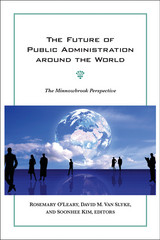
Local governments do not stand alone—they find themselves in new relationships not only with state and federal government, but often with a widening spectrum of other public and private organizations as well. The result of this re-forming of local governments calls for new collaborations and managerial responses that occur in addition to governmental and bureaucratic processes-as-usual, bringing locally generated strategies or what the authors call "jurisdiction-based management" into play.
Based on an extensive study of 237 cities within five states, Collaborative Public Management provides an in-depth look at how city officials work with other governments and organizations to develop their city economies and what makes these collaborations work. Exploring the more complex nature of collaboration across jurisdictions, governments, and sectors, Agranoff and McGuire illustrate how public managers address complex problems through strategic partnerships, networks, contractual relationships, alliances, committees, coalitions, consortia, and councils as they function together to meet public demands through other government agencies, nonprofit associations, for-profit entities, and many other types of nongovernmental organizations.
Beyond the "how" and "why," Collaborative Public Management identifies the importance of different managerial approaches by breaking them down into parts and sequences, and describing the many kinds of collaborative activities and processes that allow local governments to function in new ways to address the most nettlesome public challenges.

Today’s public managers not only have to function as leaders within their agencies, they must also establish and coordinate multi-organizational networks of other public agencies, private contractors, and the public. This important transformation has been the subject of an explosion of research in recent years. The Collaborative Public Manager brings together original contributions by some of today’s top public management and public policy scholars who address cutting-edge issues that affect government managers worldwide. State-of-the-art empirical research reveals why and how public managers collaborate and how they motivate others to do the same. Examining tough issues such as organizational design and performance, resource sharing, and contracting, the contributors draw lessons from real-life situations as they provide tools to meet the challenges of managing conflict within interorganizational, interpersonal networks. This book pushes scholars, students, and professionals to rethink what they know about collaborative public management—and to strive harder to achieve its full potential.

A once-in-a-generation event held every twenty years, the Minnowbrook conference brings together the top scholars in public administration and public management to reflect on the state of the field and its future. This unique volume brings together a group of distinguished authors—both seasoned and new—for a rare critical examination of the field of public administration yesterday, today, and tomorrow.
The book begins by examining the ideas of previous Minnowbrook conferences, such as relevance and change, which are reflective of the 1960s and 1980s. It then moves beyond old Minnowbrook concepts to focus on public administration challenges of the future: globalism, twenty-first century collaborative governance, the role of information technology in governance, deliberative democracy and public participation, the organization of the future, and teaching the next generation of leaders. The book ends by coming full circle to examine the current challenge of remaining relevant. There is no other book like this—nor is there ever likely to be another—in print. Simply put, the ideas, concepts, and spirit of Minnowbrook are one-of-a-kind. This book captures the soul of public administration past, present, and future, and is a must-read for anyone serious about the theory and practice of public administration.
READERS
Browse our collection.
PUBLISHERS
See BiblioVault's publisher services.
STUDENT SERVICES
Files for college accessibility offices.
UChicago Accessibility Resources
home | accessibility | search | about | contact us
BiblioVault ® 2001 - 2024
The University of Chicago Press









